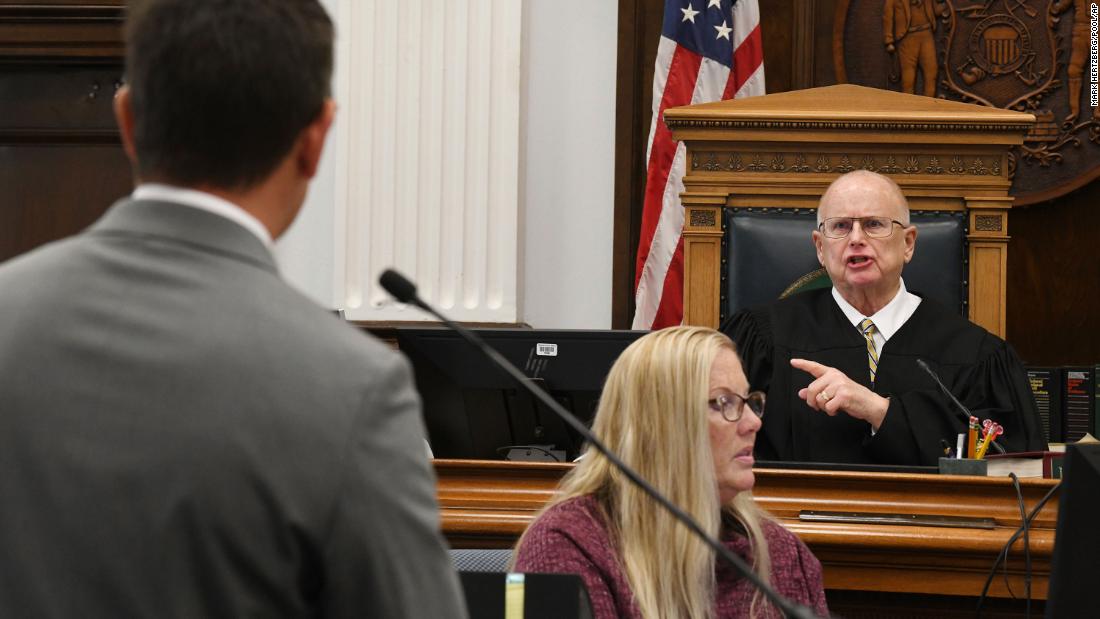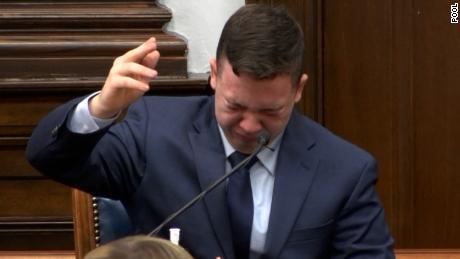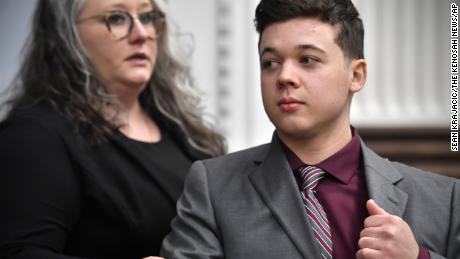To those who may not have heard of Schroeder until this week, Tuesday’s exchange with Binger may have come as a surprise — but to those who have worked with him, it emphasized his reputation.
Schroeder — the longest-serving active judge in Wisconsin’s trial courts — is viewed as a tough jurist, the type of judge who’s not afraid to make difficult decisions, no matter the response.
“He has a reputation for doing what he believes is the right thing and being an independent thinker,” said William Lynch, a retired attorney who served on the board of the ACLU of Wisconsin at the time of Schroeder’s ruling about ordering AIDS tests for sex workers in the 1980s.
Schroeder admonished the prosecutor twice
Twice during cross-examination, Schroeder asked the jury to leave the courtroom and then sharply admonished Binger for his line of questioning.
The first incident related to Binger’s questions about Rittenhouse’s post-arrest silence, a right solidified in the Fifth Amendment of the US Constitution.
“The problem is this is a grave constitutional violation for you to talk about the defendant’s silence,” Schroeder said. “You’re right on the borderline, and you may be over, but it better stop.”


The second admonishment related to questions about an incident two weeks before the shootings that Schroeder has said would not be permitted to come into evidence. Binger said he believed that incident was newly relevant to the case, but Schroeder criticized him for not asking permission first and affirmed the evidence would not be allowed.
Binger said he may have misunderstood Schroeder’s ruling.
“I thought your ruling was if the evidence in this case made that more relevant, you would admit it or at least considered it’s admittance,” Binger said.
Schroeder responded to Binger in a very sharp tone.
“Don’t get brazen with me,” Schroeder told Binger. “You know very well that an attorney can’t go into these types of areas when the judge has already ruled without asking outside the presence of the jury to do so, so don’t give me that.”
Testy exchanges affect jurors, analysts say
Civil rights attorney Areva Martin told CNN’s Ana Cabrera on Wednesday that jurors are sizing up prosecutors and defense attorneys, so the lawyers’ relationship with the judge matters.
“Prosecutors and defense attorneys have to be very careful. You’ve got to be zealous in your advocacy for your case, but you cannot disrespect a court’s ruling,” she said.
Laura Coates, a CNN legal analyst, said every prosecutor has taken their share of tongue lashings when it comes to a judge.
“Judges always believe that they are in control of the courtroom. But it’s the prosecution’s burden and therefore the prosecution’s trial,” she said.
Coates did argue that Binger thought he was able to probe certain topics — such as Rittenhouse’s intention of coming to Kenosha — that Schroeder ruled out because of the defendant’s testimony.
“The prosecutor thought the door was open by virtue of Kyle Rittenhouse’s own testimony,” Coates said. “So if the judge had ruled previously that they couldn’t bring it in, unprovoked, if he opened the door they are now entitled to do so and he’s making that record.”
This is why, Coates said, it’s dangerous for defendants to take the stand.
“No matter how rehearsed or smart they think they are, if they are not well-versed in the methodology of litigation of trial procedure and evidentiary rules, they may fall victim to their own hubris,” she said.
Schroeder has reputation for being ‘old school’
Schroeder will be 80 when his current term ends in 2026. He’s been described by some attorneys in Wisconsin as “old school.”
“That doesn’t mean that he’s old. I mean he’s 75 years old, which is older than most judges, but he’s just an old-school guy. He still operates his courtroom like it’s 1980,” said a seasoned southeast Wisconsin attorney who has appeared before Schroeder many times, but asked not to be named because he still appears before Schroeder.
Lynch, the retired attorney, told CNN Schroeder does not like to be “pushed around by either party.”
“It’s his courtroom,” Lynch said. “So he has a strong sense of his own his bearing in the courtroom.”
While this is possibly Schroeder’s most high-profile case, he’s made controversial rulings in the past.
In the late 1980s, Schroeder drew scrutiny after ordering a convicted child molester who also engaged in prostitution to get an AIDS test, according to attorney John Anthony Ward, who represented the man. Schroeder started ordering convicted sex workers to submit to AIDS tests over concerns they were spreading the virus.
In a 2008 trial where a man was accused of poisoning his wife with antifreeze, Schroeder allowed into evidence a letter the wife wrote a neighbor accusing the husband should anything happen to her. The so-called “letter from the grave” evidence proved key to conviction. Wisconsin’s Supreme Court this year ordered a new trial for the man and ruled the letter should not have been admitted as evidence.
Schroeder sentenced the defendant to life in prison without a chance of parole. Before announcing his sentence, Schroeder told the defendant: “Your crime is so enormous, so monstrous, so unspeakably cruel that it overcomes all other considerations.”
CNN’s Ray Sanchez and Eric Levenson contributed to this report.









